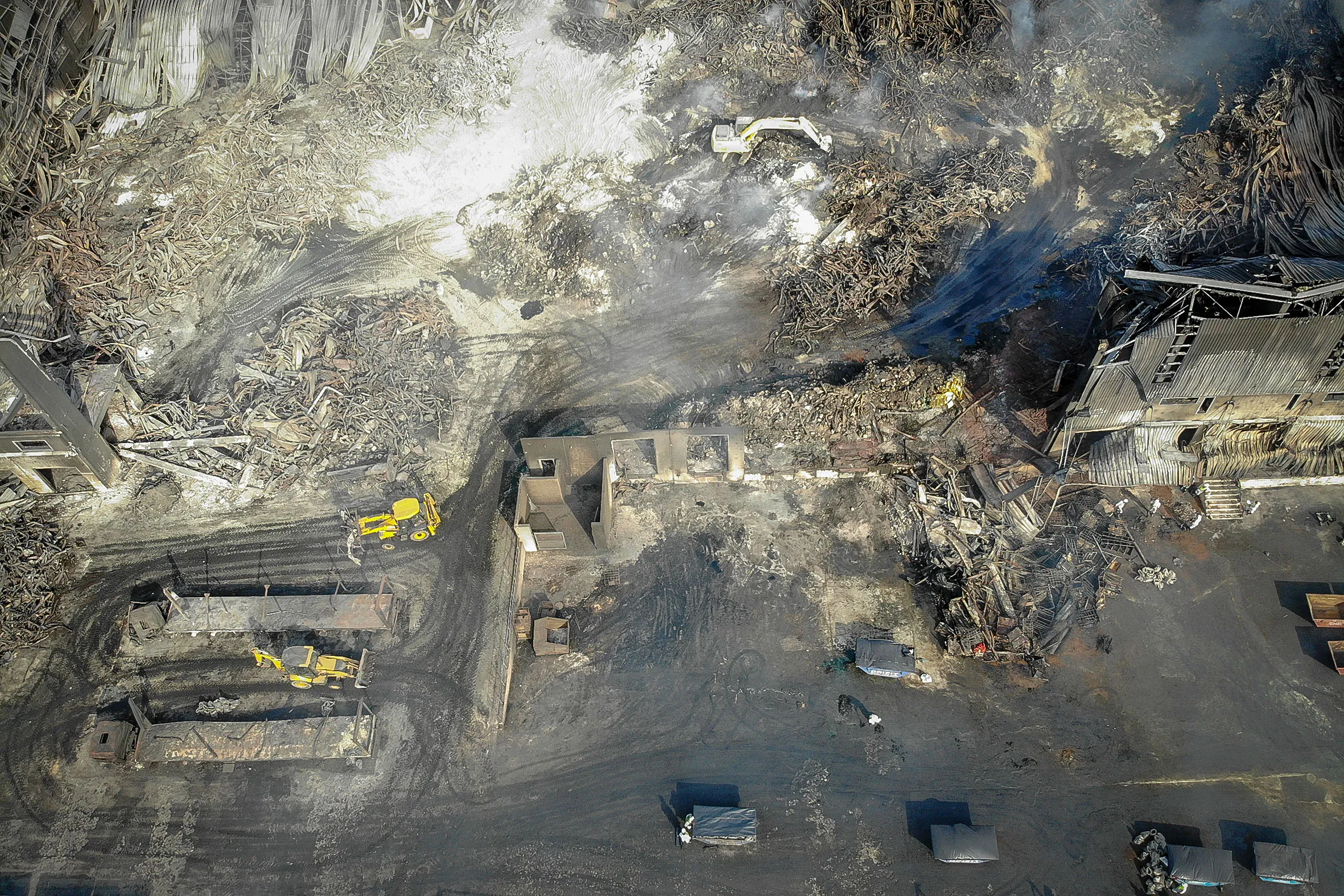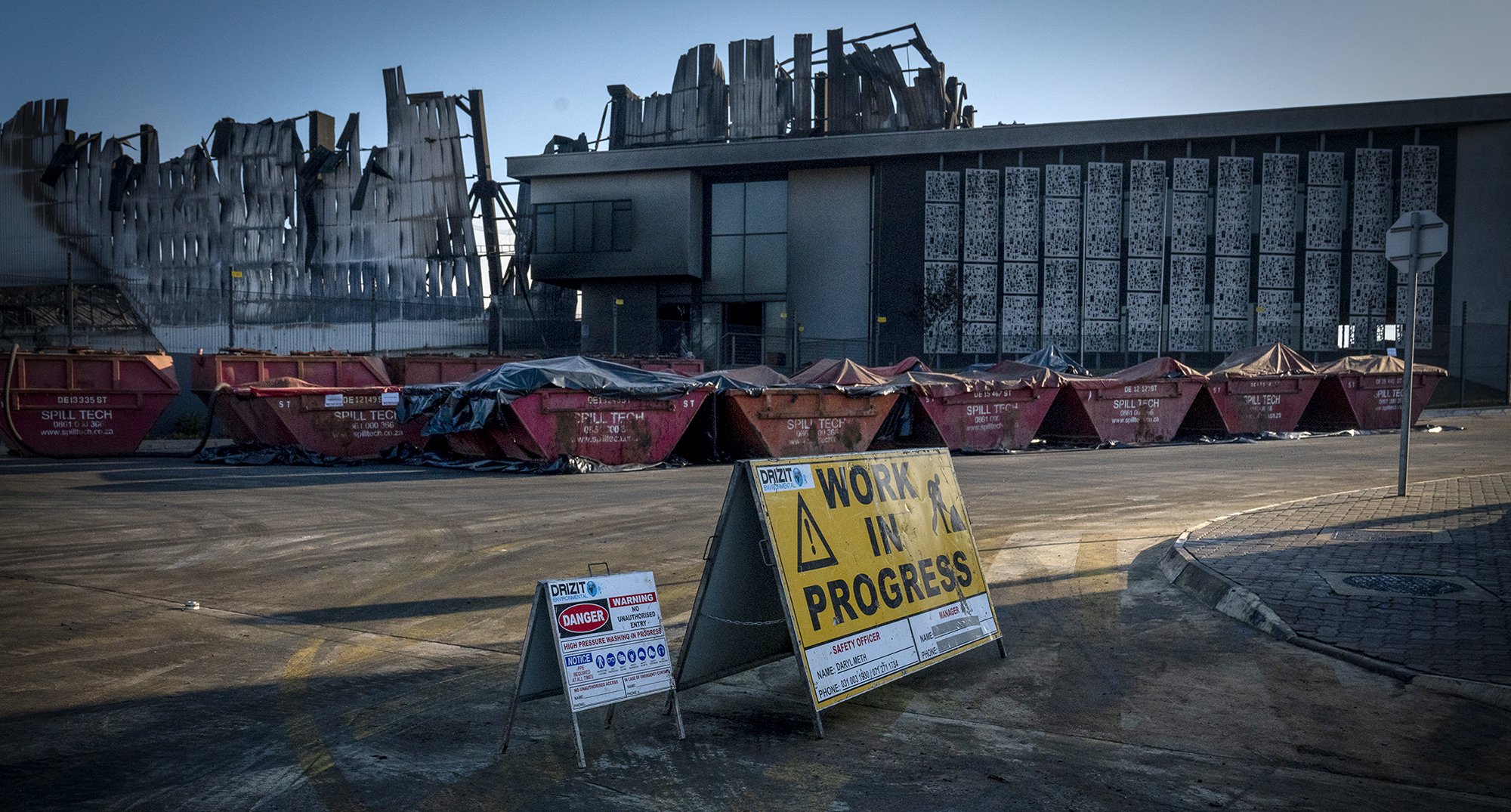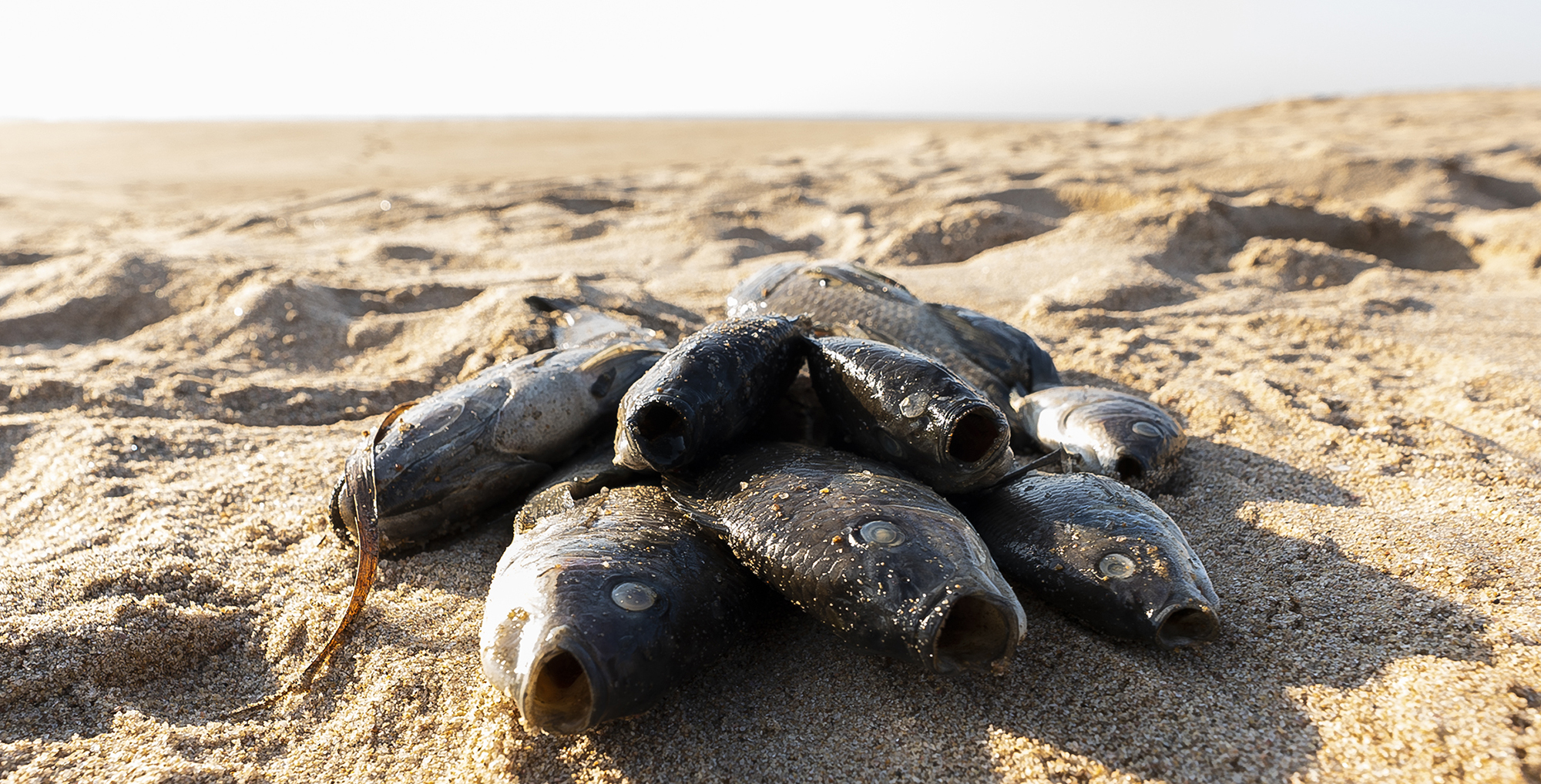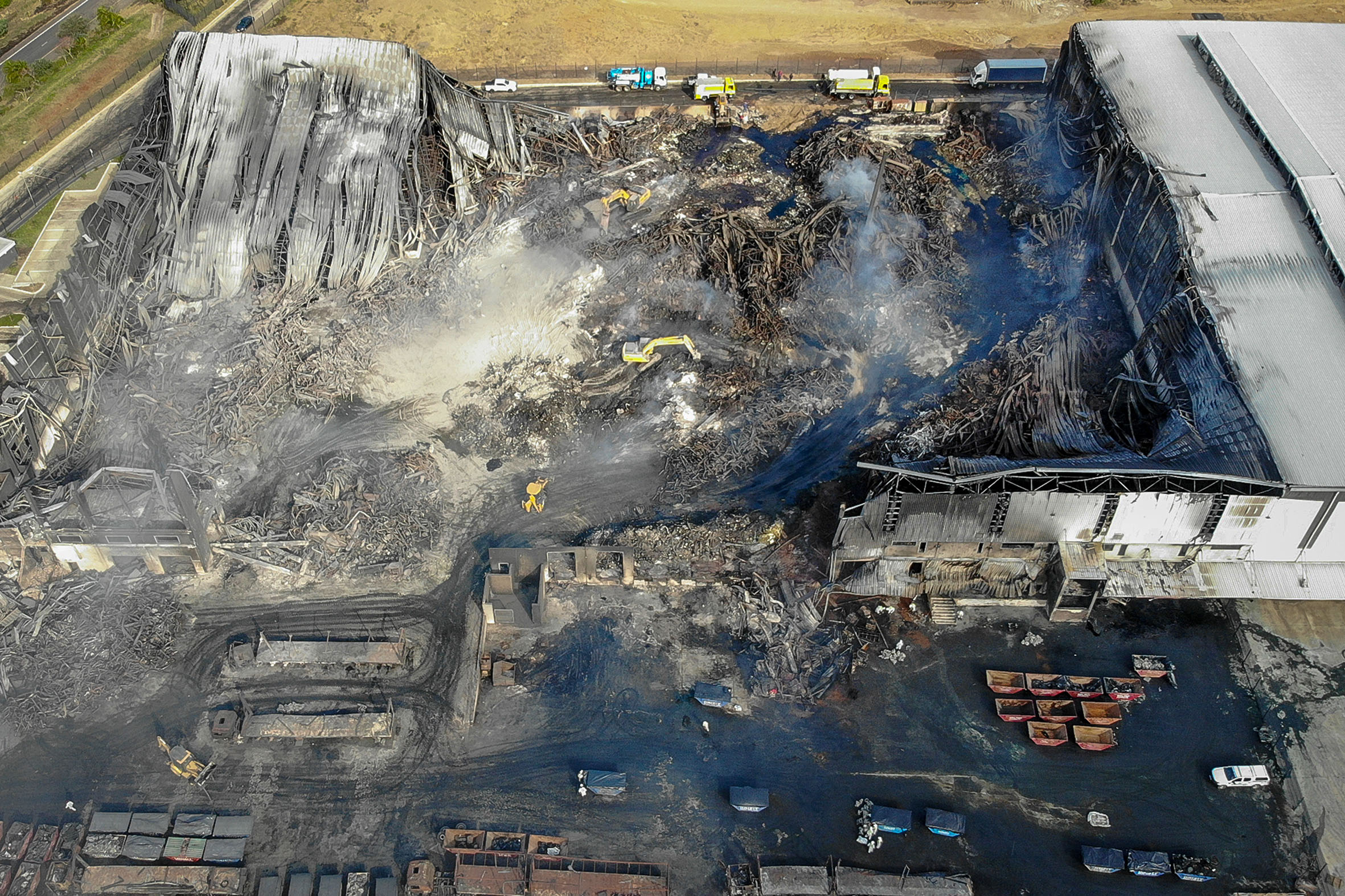The Indian pesticides multinational United Phosphorus Limited (UPL) has claimed in media statements that its toxic chemical storage house alongside suburban Durban was operating completely above board. Now it has a chance to prove these bald, as yet unsubstantiated, claims and to make its anonymous legal opinions public.
Late on Friday, an umbrella group of residents, activists, academics and researchers sent a formal application to the company in terms of the Promotion of Access to Information Act (PAIA), requiring it to disclose a wide variety of information — including proof that it took no shortcuts and was legally entitled to store thousands of tonnes of toxic or harmful chemicals close to schools and homes north of Durban.
 A drone image showing the extent of the damage caused to the UPL warehouse in northern Durban, 21 July 2021. (Photo: Shiraaz Mohamed)
A drone image showing the extent of the damage caused to the UPL warehouse in northern Durban, 21 July 2021. (Photo: Shiraaz Mohamed)
The newly established UPL Cornubia Fire Civil Society Action Group sent a list of 34 itemised information requests to UPL South Africa chief executive Jan Botha and the company’s legal representatives, Norton Rose Fulbright, and to Durban-based attorney Norman Brauteseth.
In response to requests for comment, a spokesperson for the company confirmed receipt of the 34 requests from the action group and said: “UPL is considering the PAIA request and will formally respond to the group in due course.”
The action group said the information was required to assert its members’ constitutional rights to a healthy environment and access to information — and also to hold the company accountable under the “polluter pays principle” of the National Environment Management Act, as well as several other health and labour safety laws or regulations.
Though a hitherto secret list of more than 700 chemical products stored at the warehouse was leaked and published by the amaBhungane Centre for Investigative Journalism last week, the civil society action group still wants UPL to furnish this list officially for formal evidentiary and other purposes.
The group — which includes several attorneys, public health researchers and environmental activists — asserts that the public interest trumps any claims of proprietary or “trade secrets” that UPL might put up to reject the demands.
The request was drafted by attorneys Kamini Krishna and Melissa Strydom and signed by committee members or signatories who include attorneys Kirsten Youens and Jeremy Ridl, Prof Rajen Naidoo, Prof Tracy-Lynn Field, Desmond D’Sa, Rico Euripidou, Prof Patrick Bond, Bongani Mthembu, Tsepang Molefe, Judy Bell, Kira Erwin, Pieter Burger (Wessa), Derek Robins and Dr Melissa Lewis (Birdlife), Steve Woodhall, Jeremy Dobson, Di Jones, Francine Hattingh, Jane Troughton and Greenpeace Africa.
 Waste skips containing hazardous debris lined up next to the charred remains of the UPL chemical warehouse. (Photo: Shiraaz Mohamed)
Waste skips containing hazardous debris lined up next to the charred remains of the UPL chemical warehouse. (Photo: Shiraaz Mohamed)
Rico Euripidou, one of the 11 action group committee members, told Daily Maverick he believed that UPL’s legal strategy appeared to be that it should disclose as little as possible due to the likelihood of criminal prosecution or other legal action by government, commercial and civil society groups.
Euripidou, an activist and environmental epidemiologist who trained at the London School of Hygiene and Tropical Medicine, is also concerned that national, provincial and local government authorities investigating the aftermath of the July 12-26 unrest have allowed the company to appoint most of the experts “to investigate itself”.
“To some extent, it’s almost as if the fox is in charge of the henhouse,” he charged.
Though the Joint Operations Committee (JOC) is chaired by Sabelo Ngcobo, chief director of the KZN provincial Department of Economic Development, Tourism and Environmental Affairs, concerns have been expressed by Euripidou and others that because UPL has appointed and is paying the fees of several expert consultants, the company exercises an inordinate degree of control over information flows and in shaping the scope of the information gathered, or not gathered.
While Ngcobo and other JOC officials have previously stated that the government has requested its own shopping list of information, Euripidou remains concerned about the exclusion of civil society representatives from the JOC and the “apparent absence of independent oversight” and outside experts involved in the investigation.
“There has to be a multi-stakeholder, multi-expert counter-balance to UPL and the oversight of the government authorities.”
 Dead fish lie piled near the mouth of the Ohlanga River estuary after a chemical leak at the UPL warehouse. (Photo: Shiraaz Mohamed)
Dead fish lie piled near the mouth of the Ohlanga River estuary after a chemical leak at the UPL warehouse. (Photo: Shiraaz Mohamed)
He says while the Cornubia action group remains concerned about the exclusion of civil society, it is not too late to muster the support of other local and international experts to supplement the JOC investigation — especially in establishing a comprehensive monitoring programme for people who were exposed to toxic chemicals, either by breathing fumes, swallowing or skin exposure.
While the exclusion of civil society and the issue of further independent expert involvement remains unresolved for now, the action group’s 34 demands for further information from UPL include the following:
- All correspondence and notifications from government authorities to UPL in the wake of the major chemical explosion issued under the National Environmental Management Act (Nema).
- All sampling, raw data, monitoring, and specialist reports prepared and submitted to the authorities by UPL in terms of Nema and the National Water Act.
- Copies of environmental impact assessments or basic assessments, authorisations and environmental management plan, including any listed activities relating to dangerous goods storage — or alternatively, copies of any records reflecting the basis upon which such listed activities were not triggered.
(Note: UPL claimed in a press release on 31 July that it was advised, prior to opening, that “the leasing and operating of a warehouse for its products did not trigger an environmental assessment under the Nema regulations. That advice has, since the fire, been confirmed by its legal consultants.”)
- The action group has further asked for copies of correspondence or records about advice received by UPL about any Nema Section 24G application. (This section allows companies to apply for retrospective approval for projects implemented without an EIA and to pay a fine for acting illegally).
- A copy of the property lease and agreement between UPL and the landowner or property management company dealing with the private storage of dangerous goods exceeding 80m³ in capacity.
(Note: UPL has previously asserted that it “took the view that its warehouse operation did not constitute a Major Hazardous Installation (MHI) and that it did not need to conduct a risk assessment. That view has now also been confirmed by its legal consultant.” It also asserted that the Cornubia warehouse was “located in an appropriately zoned facility that, in the opinion of its technical staff and external consultants, was fit for purpose”.
- However, the action group wants to see a copy or summary basis of these legal opinions, along with proof of any special consent it may have been given to import any chemicals banned or restricted in terms of the Rotterdam Convention which regulates international trade in hazardous chemicals.
(Note: According to UPL, “The products in the warehouse were all safely contained and packaged, and were overwhelmingly water-based, with little to low fire risk and that the designed fire and containment systems were more than adequate, in ordinary circumstances, to have enabled the facility and the relevant authorities to contain a fire and any associated spillage of product. All of the products in the warehouse were proprietary products approved for use in South Africa by the Health Department and by the Department of Agriculture in terms of Act No.36 of 1947.)
- The action group has also requested documents dealing with the disposal of hazardous waste dumped in the aftermath of the explosion.
- Records of safety data sheets of all chemicals and compliance with the Occupational Health and Safety Act (including air monitoring and medical surveillance reports for warehouse employees (excluding personal information).
- Documents demonstrating compliance with the National Building Regulations and Building Standards Act, such as building plan approval, a certificate of occupancy and approved emergency plans and fire safety measures; certificate of registration for storage of flammables and a permit under the eThekwini Scheduled Activities By-law, 2020.
- Permits and registrations of controlled goods, including any contemplated under the Non-Proliferation of Weapons of Mass Destruction Act 1993.
- Any record of state subsidisation (national, provincial, municipal or parastatal), “fast-track” approval, investment incentive, relaxed exchange control provisions, tax benefits, capital depreciation allowance, or related loopholes, or any form of concessions on payments for water, electricity, municipal services, rentals or other government-based or Cornubia-specific goods and services.
Given the company’s previous reluctance or refusal to release its chemical inventory and other documents to back up its assertions, it seems very unlikely that UPL will present most of the requested information to the action group.
 A member of a clean-up team with a respirator and chemical-resistant PPE wades through the toxic soup of chemicals left behind from the fire and fire-fighting efforts at the UPL plant in Cornubia, northern Durban. (Photo: Mlungisi Mbele)
A member of a clean-up team with a respirator and chemical-resistant PPE wades through the toxic soup of chemicals left behind from the fire and fire-fighting efforts at the UPL plant in Cornubia, northern Durban. (Photo: Mlungisi Mbele)
In terms of PAIA, the company has 30 days to respond to the request. Thereafter it can request a further 30 days’ extension to consider the request and then finally refuse to provide it.
Though activist and citizen groups have achieved varying degrees of success when using PAIA to squeeze “sensitive” information out of the government and private companies, there are no guarantees that the Cornubia group will get what it wants timeously — or at all.
In a legal assessment penned in 2014, University of Wisconsin-Milwaukee assistant professor Wilhelm Peekhaus said SA’s Promotion of Access to Information Act came into force in March 2001 and was intended to “foster a culture of transparency and accountability in public and private bodies” and to “actively promote a society in which the people of South Africa have effective access to information to enable them to more fully exercise and protect all of their rights”.
In practice, however, there was still substantial political and commercial resistance, while the success of the courts in enforcing legislation had led to a “mixed and often disappointing state of affairs” — despite PAIA being hailed by some as a gold standard internationally for information access laws.
Peekhaus noted that applicants who were refused access often had to turn to the courts, which was a “daunting and typically expensive undertaking fraught with significant uncertainty”.
“Nonetheless, the courts have established a corpus of jurisprudence that admonishes public as well as private bodies to adhere to their constitutional and statutory information disclosure obligations in ways that will contribute to the development of a balanced access to information regime as the access laws evolve.”
The Cornubia action group insists that: “It is in our interest as a group, the interest of the public and the environment to ensure that the democratic values that underlie our society, including to ensure accountability, responsiveness, and openness, are given effect to... and that those responsible for health impacts and environmental damage are held accountable.”
The Democratic Alliance has also sent a letter to Cornubia JOC chair Sabelo Ngcobo demanding similar information and stating that: “Our concern regarding the above and the impact on human life, animal life, and the environment is that, not only has there been inadequate communication with the community and with the public at large regarding the consequences of the fire and the explosion, but more concerningly there appears to be a persistent and express refusal by not only UPL but by the various public bodies (whose duty it is to serve the members of the affected communities) to release accurate information to the public regarding, not only the contents of the warehouse, but the immediate and long-term impact on both the environment and human life and well-being.”
Francois Rodgers, leader of the DA KZN provincial office said his party’s concern was not a case of “mere political grandstanding”.
“It would appear obvious that the public has a right to accurate and reliable information, and also, in the premises, the potential for false information to spread is great — to the extent that this information paints a serious picture of the disaster and its consequences, there is a possibility of the community becoming destabilised and panicked actions being taken, which may lead to greater harm.
“Having said that, however, should the situation be as serious as some rumours are beginning to suggest, it is urgently and vitally important that the public be correctly advised in order that appropriate disaster management actions can be taken.
“The public faces a great potential of immediate and long-term harm and it is incumbent on the government and regulatory authorities to empower the public with the information necessary to enable the public to look after themselves, especially in circumstances where the government and regulatory authorities appear to be failing to look after the public effectively.” DM/OBP




 Clean-up teams with respirators and chemical-resistant PPE wade through the toxic soup of chemicals left behind from the fire and fire-fighting efforts at the UPL plant in Cornubia, north of Durban. (Photo: Mlungisi Mbele)
Clean-up teams with respirators and chemical-resistant PPE wade through the toxic soup of chemicals left behind from the fire and fire-fighting efforts at the UPL plant in Cornubia, north of Durban. (Photo: Mlungisi Mbele)